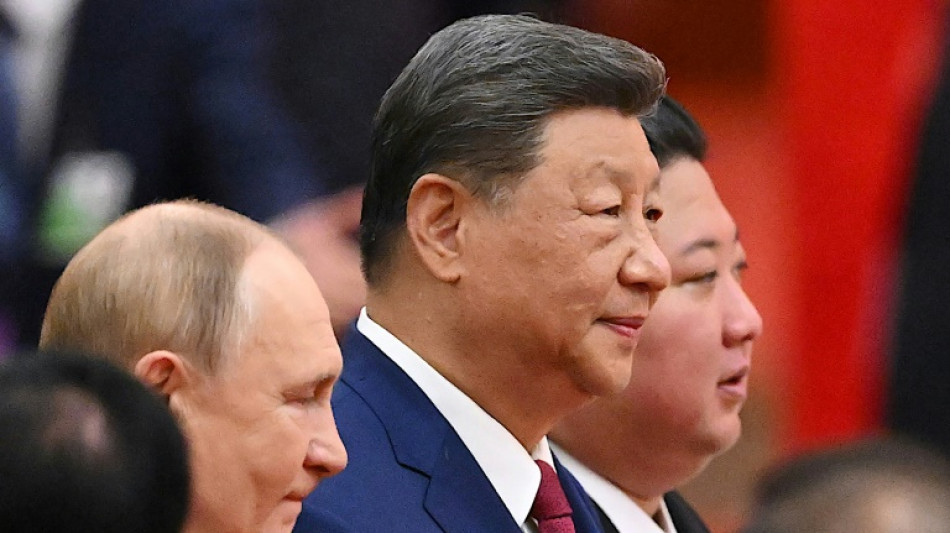
-
 Vonn to provide injury update as Milan-Cortina Olympics near
Vonn to provide injury update as Milan-Cortina Olympics near
-
France summons Musk for 'voluntary interview', raids X offices

-
 Stocks mostly climb as gold recovers
Stocks mostly climb as gold recovers
-
US judge to hear request for 'immediate takedown' of Epstein files

-
 Russia resumes large-scale strikes on Ukraine in glacial temperatures
Russia resumes large-scale strikes on Ukraine in glacial temperatures
-
Fit-again France captain Dupont partners Jalibert against Ireland

-
 French summons Musk for 'voluntary interview' as authorities raid X offices
French summons Musk for 'voluntary interview' as authorities raid X offices
-
IOC chief Coventry calls for focus on sport, not politics

-
 McNeil's partner hits out at 'brutal' football industry after Palace move collapses
McNeil's partner hits out at 'brutal' football industry after Palace move collapses
-
Proud moment as Prendergast brothers picked to start for Ireland

-
 Germany has highest share of older workers in EU
Germany has highest share of older workers in EU
-
Teen swims four hours to save family lost at sea off Australia

-
 Ethiopia denies Trump claim mega-dam was financed by US
Ethiopia denies Trump claim mega-dam was financed by US
-
Norway crown princess's son pleads not guilty to rapes as trial opens

-
 Russia resumes strikes on freezing Ukrainian capital ahead of talks
Russia resumes strikes on freezing Ukrainian capital ahead of talks
-
Malaysian court acquits French man on drug charges

-
 Switch 2 sales boost Nintendo profits, but chip shortage looms
Switch 2 sales boost Nintendo profits, but chip shortage looms
-
China to ban hidden car door handles, setting new safety standards

-
 Switch 2 sales boost Nintendo results but chip shortage looms
Switch 2 sales boost Nintendo results but chip shortage looms
-
From rations to G20's doorstep: Poland savours economic 'miracle'

-
 Russia resumes strikes on freezing Ukrainian capital
Russia resumes strikes on freezing Ukrainian capital
-
'Way too far': Latino Trump voters shocked by Minneapolis crackdown

-
 England and Brook seek redemption at T20 World Cup
England and Brook seek redemption at T20 World Cup
-
Coach Gambhir under pressure as India aim for back-to-back T20 triumphs

-
 'Helmets off': NFL stars open up as Super Bowl circus begins
'Helmets off': NFL stars open up as Super Bowl circus begins
-
Japan coach Jones says 'fair' World Cup schedule helps small teams

-
 Equities and precious metals rebound after Asia-wide rout
Equities and precious metals rebound after Asia-wide rout
-
Do not write Ireland off as a rugby force, says ex-prop Ross

-
 Winter Olympics 2026: AFP guide to Alpine Skiing races
Winter Olympics 2026: AFP guide to Alpine Skiing races
-
Winter Olympics to showcase Italian venues and global tensions

-
 Buoyant England eager to end Franco-Irish grip on Six Nations
Buoyant England eager to end Franco-Irish grip on Six Nations
-
China to ban hidden car door handles in industry shift

-
 Sengun leads Rockets past Pacers, Ball leads Hornets fightback
Sengun leads Rockets past Pacers, Ball leads Hornets fightback
-
Waymo raises $16 bn to fuel global robotaxi expansion

-
 Netflix to livestream BTS comeback concert in K-pop mega event
Netflix to livestream BTS comeback concert in K-pop mega event
-
Rural India powers global AI models

-
 US House to vote Tuesday to end shutdown
US House to vote Tuesday to end shutdown
-
Equities, metals, oil rebound after Asia-wide rout

-
 Bencic, Svitolina make history as mothers inside tennis top 10
Bencic, Svitolina make history as mothers inside tennis top 10
-
Italy's spread-out Olympics face transport challenge

-
 Son of Norway crown princess stands trial for multiple rapes
Son of Norway crown princess stands trial for multiple rapes
-
Side hustle: Part-time refs take charge of Super Bowl

-
 Paying for a selfie: Rome starts charging for Trevi Fountain
Paying for a selfie: Rome starts charging for Trevi Fountain
-
Faced with Trump, Pope Leo opts for indirect diplomacy

-
 NFL chief expects Bad Bunny to unite Super Bowl audience
NFL chief expects Bad Bunny to unite Super Bowl audience
-
Australia's Hazlewood to miss start of T20 World Cup

-
 Bill, Hillary Clinton to testify in US House Epstein probe
Bill, Hillary Clinton to testify in US House Epstein probe
-
Cuba confirms 'communications' with US, but says no negotiations yet

-
 Iran orders talks with US as Trump warns of 'bad things' if no deal reached
Iran orders talks with US as Trump warns of 'bad things' if no deal reached
-
From 'watch his ass' to White House talks for Trump and Petro


Could humans become immortal, as Putin was heard telling Xi?
Vladimir Putin and Xi Jinping have been recorded on a hot mic discussing how organ transplants and other medical advances could let humans live past 150 years -- or even become immortal.
But are these comments by the Russian and Chinese leaders, which were picked up during a Beijing summit on Wednesday, backed by scientific evidence?
Experts in human ageing told AFP that some of these ideas remain far-fetched, but serious research is also increasingly revealing more about why we age -- and how we could try to stop it.
- Is there a human lifespan limit? -
The conversation suggested that fending off the ravages of age was on the minds of Putin and Xi, who are both 72 and have not expressed any desire to step down.
Thanks to the "development of biotechnology, human organs can be continuously transplanted, people could get younger as they grow older, and may even become immortal", Putin told Xi.
The Chinese leader responded by saying there were predictions humans could "live to 150 years old" within this century.
There is no scientific evidence to support the idea that a human could live forever.
Scientists have not even reached a consensus on whether there is a biological limit on human lifespan.
"The debate is not settled," Ilaria Bellantuono, a researcher on the biology of ageing at the University of Sheffield, told AFP.
Indeed, despite massive progress in most areas of health in the last few decades, human longevity records have stopped being broken.
France's Jeanne Calment, who died at the age of 122 in 1997, still holds the record for oldest confirmed age.
This does not necessarily mean we have reached the limits of longevity.
According to 2018 research in the journal Science, mortality rates eventually level off, meaning a 115-year-old is no more at risk of dying than someone aged 105.
Other researchers have warned that data about extreme longevity could be misleading, citing numerous cases of people forging birth certificates to commit pension fraud.
- What about replacing organs? -
Putin's comments went beyond simply fending off death, suggesting that by regularly replacing misfiring organs people could actually become younger.
"It's pure madness," said Eric Boulanger, a professor of biology and ageing at France's Lille University.
Boulanger listed a broad range of medical barriers and ethical concerns, including the constant need for fresh organs and the traumatic effect that repeated transplant surgeries would have on the body.
And our bodies are made up of more than just organs, he emphasised.
They also have fatty tissue, bones and more, all impacted by ageing in a complex and interconnected way that makes the concept of changing out organs like car parts unrealistic.
- Money in long life? -
Huge amounts of money have recently been invested in longevity efforts, which have also been the subject of a booming lifestyle and wellness industry.
Putin himself has shown interest, with Russia launching a 38-billion-ruble ($460-million) project last year focused on regenerative medicine and longevity.
The subject is also a preoccupation of the Silicon Valley-led transhumanist movement, including billionaire Peter Thiel, a supporter of US President Donald Trump who has invested millions in longevity projects.
Fellow tech figure Bryan Johnson has become somewhat emblematic of the issue by setting himself the goal of eternal life -- and testing many of the latest anti-ageing theories, techniques and trends on himself.
However, mainstream scientists have been critical of such efforts, warning they lack scientific rigour and could even be dangerous.
- Realistic research? -
Some recent scientific advances have raised hopes we could one day fight back against ageing.
The researchers interviewed by AFP in particular highlighted a field called epigenetics.
Changes to DNA have long been thought to be an important factor in why humans age.
However, epigenetics -- which studies how genes can toggle on or off without altering DNA -- has recently gained attention.
Over time, this toggling seems to wear down in a process thought to be central to ageing.
Research published in the journal Aging Cell in June found that the drug rapamycin -- which appears to affect epigenetic ageing -- has helped extend the lifespan of several animals, including mice.
But there is no guarantee the drug will work in humans.
For now, the researchers suggested people worry less about hypothetical ways to increase how long they are alive and instead make sure the time they have left is lived well.
"The focus should be on extending the number of years in good health," Bellantuono said.
R.Shaban--SF-PST



